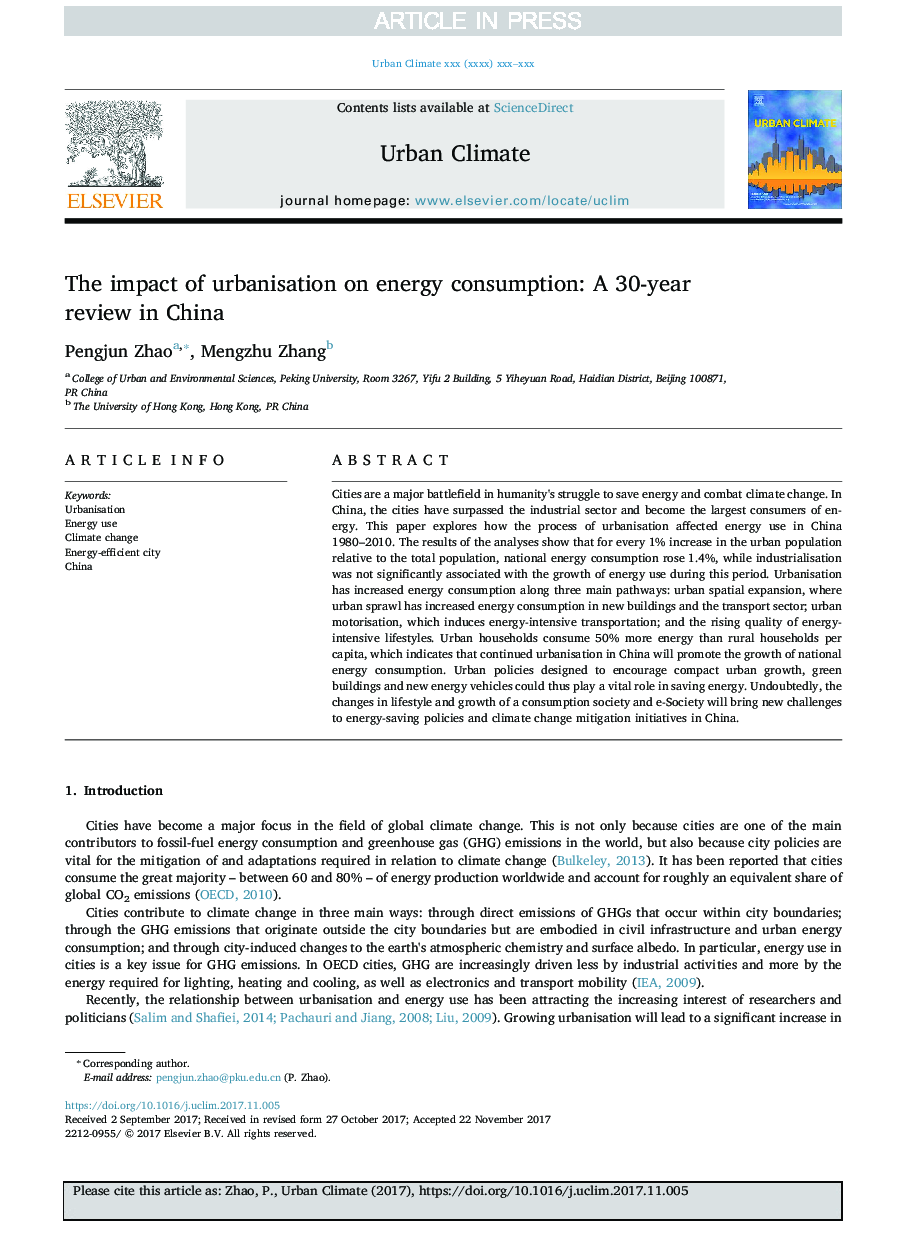| کد مقاله | کد نشریه | سال انتشار | مقاله انگلیسی | نسخه تمام متن |
|---|---|---|---|---|
| 6576934 | 1422839 | 2018 | 14 صفحه PDF | دانلود رایگان |
عنوان انگلیسی مقاله ISI
The impact of urbanisation on energy consumption: A 30-year review in China
ترجمه فارسی عنوان
تأثیر شهرنشینی بر مصرف انرژی: بررسی 30 ساله در چین
دانلود مقاله + سفارش ترجمه
دانلود مقاله ISI انگلیسی
رایگان برای ایرانیان
کلمات کلیدی
شهرنشینی، استفاده از انرژی، تغییر آب و هوا، شهر با صرفه جویی در انرژی، چین،
ترجمه چکیده
شهرها یک میدان جنگ بزرگ در مبارزه بشریت برای صرفه جویی در انرژی و مبارزه با تغییرات اقلیمی هستند. در چین، شهرها از بخش صنعت فراتر رفته و بزرگترین مصرف کننده انرژی هستند. این مقاله به بررسی چگونگی روند شهرسازی در تأثیر مصرف انرژی در چین در سالهای 1980 تا 2010 اشاره دارد. نتایج تجزیه و تحلیل ها نشان می دهد که برای هر 1٪ افزایش جمعیت شهری نسبت به کل جمعیت، مصرف انرژی ملی 1.4٪ افزایش یافته است، در حالیکه صنعتی شدن با رشد مصرف انرژی در این دوره ارتباطی معنی داری ندارد. شهرنشینی مصرف انرژی را در سه مسیر اصلی افزایش داده است: گسترش فضایی شهری، در حالی که گسترش فضای شهری باعث افزایش مصرف انرژی در ساختمان های جدید و بخش حمل و نقل می شود؛ موتور سازی شهری، که باعث حمل و نقل انرژی شدید می شود؛ و افزایش کیفیت زندگی سبک زندگی پر انرژی. خانوارهای شهری 50 درصد انرژی بیشتری نسبت به خانوارهای روستایی در سرانه مصرف می کنند، که نشان می دهد که ادامه شهرنشینی در چین موجب رشد مصرف انرژی ملی خواهد شد. سیاست های شهری طراحی شده برای تشویق رشد جمعیت شهری، ساختمان های سبز و وسایل نقلیه انرژی جدید می تواند نقش حیاتی در صرفه جویی در انرژی داشته باشد. بدون شک، تغییرات در شیوه زندگی و رشد جامعه مصرف و جامعه الکترونیک چالش های جدیدی را برای سیاست های صرفه جویی در انرژی و اقدامات کاهش تغییرات اقلیمی در چین به همراه خواهد داشت.
موضوعات مرتبط
مهندسی و علوم پایه
علوم زمین و سیارات
علوم زمین و سیاره ای (عمومی)
چکیده انگلیسی
Cities are a major battlefield in humanity's struggle to save energy and combat climate change. In China, the cities have surpassed the industrial sector and become the largest consumers of energy. This paper explores how the process of urbanisation affected energy use in China 1980-2010. The results of the analyses show that for every 1% increase in the urban population relative to the total population, national energy consumption rose 1.4%, while industrialisation was not significantly associated with the growth of energy use during this period. Urbanisation has increased energy consumption along three main pathways: urban spatial expansion, where urban sprawl has increased energy consumption in new buildings and the transport sector; urban motorisation, which induces energy-intensive transportation; and the rising quality of energy-intensive lifestyles. Urban households consume 50% more energy than rural households per capita, which indicates that continued urbanisation in China will promote the growth of national energy consumption. Urban policies designed to encourage compact urban growth, green buildings and new energy vehicles could thus play a vital role in saving energy. Undoubtedly, the changes in lifestyle and growth of a consumption society and e-Society will bring new challenges to energy-saving policies and climate change mitigation initiatives in China.
ناشر
Database: Elsevier - ScienceDirect (ساینس دایرکت)
Journal: Urban Climate - Volume 24, June 2018, Pages 940-953
Journal: Urban Climate - Volume 24, June 2018, Pages 940-953
نویسندگان
Pengjun Zhao, Mengzhu Zhang,
